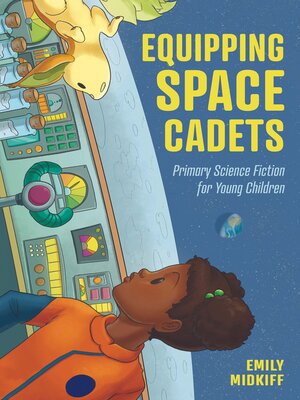Equipping Space Cadets
ebook ∣ Primary Science Fiction for Young Children · Children's Literature Association
By Emily Midkiff

Sign up to save your library
With an OverDrive account, you can save your favorite libraries for at-a-glance information about availability. Find out more about OverDrive accounts.
Find this title in Libby, the library reading app by OverDrive.



Search for a digital library with this title
Title found at these libraries:
| Library Name | Distance |
|---|---|
| Loading... |
Winner of the 2023 Science Fiction Research Association (SFRA) Book Award
2022 Longlist Nominee for the Best Non-Fiction Award from the British Science Fiction Association
Equipping Space Cadets: Primary Science Fiction for Young Children argues for the benefits and potential of "primary science fiction," or science fiction for children under twelve years old. Science fiction for children is often disregarded due to common misconceptions of childhood. When children are culturally portrayed as natural and simple, they seem like a poor audience for the complex scientific questions brought up by the best science fiction. The books and the children who read them tell another story.
Using three empirical studies and over 350 children's books including If I Had a Robot Dog, Bugs in Space, and Commander Toad in Space, Equipping Space Cadets presents interdisciplinary evidence that science fiction and children are compatible after all. Primary science fiction literature includes many high-quality books that cleverly utilize the features of children's literature formats in order to fit large science fiction questions into small packages. In the best of these books, authors make science fiction questions accessible and relevant to children of various reading levels and from diverse backgrounds and identities.
Equipping Space Cadets does not stop with literary analysis, but also presents the voices of real children and practitioners. The book features three studies: a survey of teachers and librarians, quantitative analysis of lending records from school libraries across the United States, and coded read-aloud sessions with elementary school students. The results reveal how children are interested in and capable of reading science fiction, but it is the adults, including the most well-intentioned librarians and teachers, who hinder children's engagement with the genre due to their own preconceptions about the genre and children.
2022 Longlist Nominee for the Best Non-Fiction Award from the British Science Fiction Association
Equipping Space Cadets: Primary Science Fiction for Young Children argues for the benefits and potential of "primary science fiction," or science fiction for children under twelve years old. Science fiction for children is often disregarded due to common misconceptions of childhood. When children are culturally portrayed as natural and simple, they seem like a poor audience for the complex scientific questions brought up by the best science fiction. The books and the children who read them tell another story.
Using three empirical studies and over 350 children's books including If I Had a Robot Dog, Bugs in Space, and Commander Toad in Space, Equipping Space Cadets presents interdisciplinary evidence that science fiction and children are compatible after all. Primary science fiction literature includes many high-quality books that cleverly utilize the features of children's literature formats in order to fit large science fiction questions into small packages. In the best of these books, authors make science fiction questions accessible and relevant to children of various reading levels and from diverse backgrounds and identities.
Equipping Space Cadets does not stop with literary analysis, but also presents the voices of real children and practitioners. The book features three studies: a survey of teachers and librarians, quantitative analysis of lending records from school libraries across the United States, and coded read-aloud sessions with elementary school students. The results reveal how children are interested in and capable of reading science fiction, but it is the adults, including the most well-intentioned librarians and teachers, who hinder children's engagement with the genre due to their own preconceptions about the genre and children.







